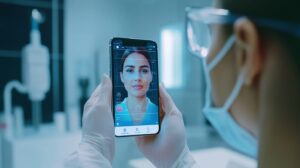
The Secret to Hiring Interns Who Excel
An interview with Danielle Kelvas, MD, CEO & Founder of DKMD Consulting, and Physician Advisor for IT Medical
Q: Can you tell us about DKMD Consulting? What services does the company provide, and who are your main customers?
I founded DKMD Consulting three years ago. We are a medical writing and consulting firm that helps medical devices, telemedicine, research, and tech companies with their medical communication and writing.
An example of a client is IT Medical. They are a healthcare software development company specializing in creating advanced, user-centric solutions such as CRM, E-commerce, patient portals, and various management systems to streamline patient care and provider operations. They are a great group of people to work with.
Q: What has been your experience with hiring interns? Which students stood out the most during the interview process, and why?
I know from experience that interns can be an excellent investment and rewarding experience, but it completely depends on how well you lead. Even students who may be a bit behind, or need extra guidance, can be fantastic interns if you figure out how to best communicate and teach them.
If you genuinely enjoy teaching (as I do) and are okay with an intern who doesn’t have ample experience (that’s fine with me), then I’m looking for someone who is:
- Coachable
- Receives feedback well (doesn’t get defensive or develops a bad attitude)
- Comfortable with failing forward
- Enjoys learning
I interview well and ask very direct questions. I’m good at weeding out students who give any red flags that they aren’t teachable. Interns will inevitably make mistakes, that’s a part of the learning journey, but I want someone who will proactively take steps to correct those mistakes and simply continue to fail forward with a smile on their face and a good attitude.
I made so many mistakes as a medical student and intern, and I remember how that felt. I haven’t forgotten how hard it is to be a student. It’s really tough being wrong more than you’re right for years, so I need an intern who doesn’t get put out every time they make a mistake.
If I need to rely on the intern more heavily and need them to have extensive background knowledge, then I look for someone older with a deeper vocational history. The world has to mold you a bit for you to develop those soft skills - conflict management, communication, emotional intelligence, resilience, teamwork, time management, adaptability - things an education can’t give you.
I ask deeper ethical questions. If someone is already in their 30s and doesn’t have at least some or most of those soft skills, then I toss their CV. As you get older, make sure your application highlights those soft skills.
Q: Why did you decide to partner with the University of Chattanooga, Tennessee, to hire cybersecurity interns? What does this arrangement look like, and do students earn course credits as part of their internship?
Working alongside some of our clients, like IT Medical, really opened my eyes to how pervasive and imminent cyber terrorism is, especially in medicine. IT Medical and others have educated me that you will get hacked, it’s just a matter of time.
I went down the YouTube rabbit hole one evening and thought Gosh, I really need to button up my company with a cybersecurity team. UT Chattanooga spoke at my rotary club for lunch one afternoon, and I made a bee-line for them after the presentation. I just told them, I’m in, tell me what I need to do. Happy to add an intern to the mix.
The interns have classes from 8 am to noon every day, and then they’re with us from 1 pm to 5 pm. We’re all remote. This means my interns can work from anywhere, and I pay them directly. They’re technically one of my part-time employees.
Yes, they earn credits by working with us.
Q: What are you looking for in cybersecurity interns? What specific skills should they have? Do you focus solely on technical skills, or do soft skills matter as well?
I touched on this a bit above, but I’ll go deeper. I’m looking for specific examples that show me (don’t just tell me, I need real-life stories) that you have some of the following. I don’t expect perfection in interns or deep knowledge about cybersecurity just yet. I enjoy teaching. I’m really grateful to the mentors I had, and I’m happy to pay the life lessons forward.
- Effective Communication: The ability to articulate thoughts clearly, listen actively, and communicate in a professional manner with diverse groups. We’re an international company, so cultural competence is a plus. Foreign to Familiar is an excellent book for this.
- Leadership Abilities: The competence to guide a team, make decisions, inspire others, and take initiative when necessary. This isn’t a requirement, but a skill I try to work on with interns. I don’t care if they’re not born leaders. Knowing how to direct a team, regardless of your personality type, is a really important skill set.
- Emotional Intelligence: Understanding and managing one’s own emotions, as well as empathizing with others, to foster positive workplace relationships. Depending on their age, if someone can’t demonstrate this in an interview, I’m wary of hiring them. Letters of recommendation can help speak to this if you can’t nail it down in an interview.
- Problem-Solving: A knack for identifying issues, analyzing potential solutions, and implementing effective resolutions. To me, this is critical as a future cybersecurity professional.
- Time Management: The capability to prioritize tasks, manage one's time efficiently, and meet deadlines are absolutely critical skills to master by the time you’re done working with me. If I didn’t teach you this, then I failed you.
- Conflict Resolution: This skill includes mediating disputes, finding common ground, and maintaining peace within a team. You’ll spend the rest of your life learning this, and it’s always a work in progress. I recommend Nonviolent Communication, which will work in literally every relationship in life.
- Adaptability: The willingness to learn, be flexible, and adjust to changing workplace dynamics or job requirements.
- Teamwork and Collaboration: The ability to work well with others, contribute to team goals, and understand the dynamics of group work. In other words, do you play well in the sandbox? If not, then I recommend therapy to figure it out.
- Critical Thinking: Applying logical thought processes to analyze situations and make considered decisions.
- Project Management: Overseeing projects from inception to completion, ensuring goals are met and teams are coordinated. The ability to follow through cannot be overstated.
- Creativity and Innovation: The creativity to generate new ideas and the willingness to implement innovative solutions to problems. Tips to interns: CEOs love this. Learn how to give feedback “up” to management. If they don’t like this, then maybe it's time to find a new job.
- Resilience: The ability to cope with setbacks, maintain a positive attitude, and persist through challenges.
Q: What advice would you give to someone aspiring to enter the health IT field? What steps should they take to build a successful career?
Find a few mentors with whom you really connect, and follow their advice consistently for a long time.
This field is constantly changing: sign up for newsletters and stay informed.
Medicine is a selfish lover. I used to boast about the “work hard, play hard” adage, but it’s terribly impractical and not sustainable. I lived that way for years. Find a balance. Stick with it.
Be coachable. You will never “arrive” and will always be “in process.” Someone will always know more than you, so listen hard enough that they’ll tell you.
And when you’re done with school, get jobs with companies like IT Medical. They run an ethical, clean, brilliant operation, and value your creativity.









